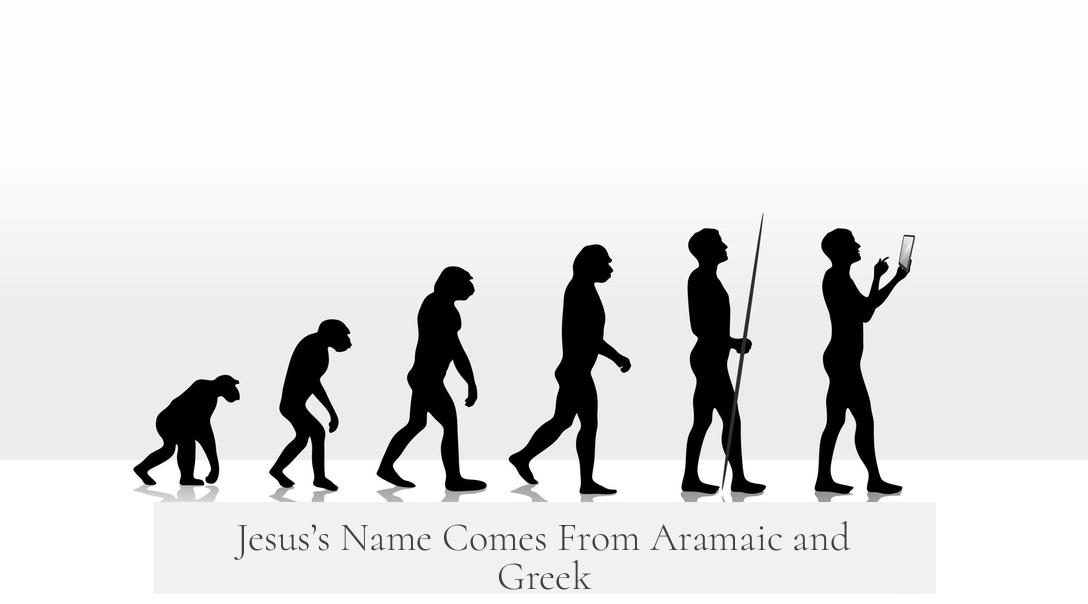The name Jesus is used instead of Joshua due to differences in original languages, translations, and historical developments of the names from Hebrew, Aramaic, Greek, and Latin into English.
The name Joshua comes directly from the Hebrew יְהוֹשֻׁעַ Yehoshua. This name is preserved in English as Joshua and reflects its Biblical Hebrew origin without major alteration.
Jesus’ name originated differently. It comes from the Aramaic יֵשׁוּע (*Yeshu*) or Hebrew יֵשׁוּעַ Yeshua. Aramaic was likely the everyday language of Jesus and his followers. The Gospels, however, were written in Greek, which rendered this name as Ἰησοῦς Iesous. This Greek form is a transliteration reflecting the Aramaic pronunciation rather than the Hebrew Yehoshua.
The journey from “Iesous” to the English “Jesus” follows a clear path:
- The Greek Ἰησοῦς (Iesous) was adopted into Latin as Iesus.
- From Latin, the name entered Middle English as Jhesus or Iesus.
- Modern English transformed this form into Jesus, reflecting changes in spelling and pronunciation.
This contrasts with Joshua, which remained closer to the original Hebrew. The variation arises because the New Testament context and language caused the Aramaic/Hebrew Yeshua to be recorded in Greek and later Latin forms, evolving distinctly from the Hebrew Yehoshua.
This explains why two related Hebrew names produced two different English names today. Joshua is a direct Hebrew-to-English transliteration. Jesus is English via Greek and Latin, starting from a related but linguistically distinct Aramaic/Hebrew form.
For further detailed linguistic history and the transformation process of Yeshua to Jesus, extensive analyses exist, such as discussions on scholarly forums and historical texts.
- Joshua comes from Hebrew Yehoshua.
- Jesus derives from Aramaic/Hebrew Yeshua, rendered in Greek as Iesous.
- Greek Iesous became Latin Iesus, then Middle English Jhesus/Iesus, and finally Modern English Jesus.
- Different linguistic paths explain the difference in English usage.
Why We Use the Name Jesus Instead of Joshua?

It’s a question many people ask. Why is the name Jesus used in English translations of the New Testament, yet Joshua is another well-known biblical name that sounds so similar? At first glance, they almost sound like twins separated at birth. But the answer takes us on a fascinating journey through language, culture, and history.
The short answer? The names come from related but distinct origins with different linguistic paths, which explains why we say Jesus in the New Testament but Joshua in the Old. Let’s dig deeper.
The Hebrew Roots of Joshua
The name we recognize as Joshua in English directly comes from the Hebrew name יְהוֹשֻׁעַ (Yehoshua). This older form means “The LORD is salvation” or “Yahweh saves.”
Joshua is a central figure in the Hebrew Bible, remembered as the faithful successor of Moses, leading the Israelites into the Promised Land. The name Yehoshua is firmly rooted in Biblical Hebrew writings and culture, and its English adoption comes straight from this heritage without much detour.
In short, Joshua is the English version of a straightforward Hebrew name, keeping much of its original form.
Jesus’s Name Comes From Aramaic and Greek

Jesus’s name, however, has a different story, though related to that same root.
Jesus’s original name in the everyday language he likely spoke — Aramaic — was יֵשׁוּעַ (Yeshu) or in Hebrew form יֵשׁוּעַ (Yeshua). Like Yehoshua, it also means “Yahweh saves.” So far, so familiar.
But here’s the twist: the Gospels were written in Greek, not Hebrew or Aramaic. When the Gospel authors translated Jesus’s name into Greek, they rendered it as Ἰησοῦς (Iesous). That’s not a random Greek name but a phonetic approximation suited to Greek sounds and grammar.
This means the name took an intermediary step. It originated as Aramaic/Hebrew Yeshua in daily use, then transformed to Iesous in written Greek texts. This Greek form was more accessible to a wider audience in the Roman Empire.
From Iesous to Jesus: A Language Evolution
The story doesn’t end there. Latin speakers adopted the Greek Iesous as Iesus. In Latin, the letter J didn’t exist as a separate character. English speakers later inherited this word from Latin through Middle English texts, where spellings like Jhesus and Iesus persisted.
Eventually, the letter J emerged as distinct from I in English alphabet development. This change fixed the spelling to what modern readers recognize: Jesus.
This linguistic detour from Yeshua through Greek and Latin is why the New Testament uses Jesus in English instead of Joshua.
So, Why Not Just Translate Jesus to Joshua?

This question pops up often. Since the names share the same Hebrew root and meaning, why not just say Joshua when reading the New Testament?
The core reason is historical linguistic context. The Old Testament, written mainly in Hebrew, preserves the original name Yehoshua, which naturally became Joshua in English.
Meanwhile, the New Testament was composed in Greek. The Greek Iesous became established as the name for Jesus because it reflects the actual name used in Aramaic among Jesus and his disciples, who spoke that language daily.
Translating the New Testament name into Joshua would overlook the original Greek manuscripts and historical context. Jesus isn’t just a different name; it represents the distinct cultural and linguistic setting of the time.
A Handy Comparison Table to Visualize
| Name | Original Language | Original Form | Meaning | English Form |
|---|---|---|---|---|
| Joshua | Hebrew | יְהוֹשֻׁעַ (Yehoshua) | “The LORD is salvation” | Joshua |
| Jesus | Aramaic / Hebrew | יֵשׁוּעַ (Yeshua) / יֵשׁוּע (Yeshu) | “Yahweh saves” | Jesus (from Greek Ἰησοῦς Iesous, Latin Iesus) |
Practical Takeaway: Why Does This Matter?

Understanding why we say Jesus instead of Joshua shows us the power of language in shaping identity and history. It’s not just about names—it’s about how stories are told, adapted, and preserved across cultures.
If you ever find yourself puzzled when hearing “Jesus” and “Joshua” and wondering if they refer to the same person, rest assured: they are different figures in the Bible, connected yet distinct. The name difference also respects the linguistic path that reflects their unique historical settings.
In our multilingual and multicultural world, this is a great reminder to appreciate the nuances of translation. Sometimes, a name carries with it centuries of linguistic evolution, not just a simple label.
Want to Dive Deeper?
If you nerd out on this stuff like a history and language buff (or want to win quiz nights), here’s a detailed explanation that unpacks the journey from Yeshua to Jesus. It’s a fascinating read!
Final Thoughts
So, next time you see the name Jesus in the New Testament and Joshua in the Old, you can smile knowingly. These names are linguistic cousins, connected but not identical, traveling through Hebrew, Aramaic, Greek, Latin, and English—all to arrive in your Bible today as distinctly as they were nearly two millennia ago.
Language isn’t static. It breathes life into history and culture, molding how we recognize and relate to figures from the past. No matter which name you say, the meaning remains powerful: Yahweh saves.




